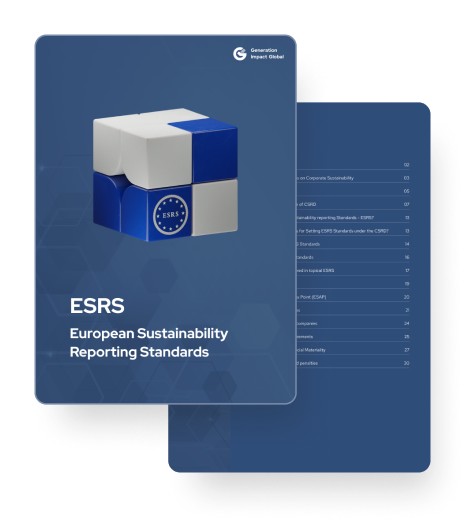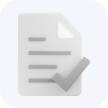Your path to CSRD compliance: Streamlined, Simplified, and Impactful
Embrace sustainability with confidence
Generation Impact Global’s CSRD Tool offers an all-in-one solution designed to help businesses meet compliance requirements while driving real-world sustainability impact.

Our approach integrates:

ESRS Tool
European Sustainability Reporting Standards
The ESRS tool ensures organisations stay aligned with ESRS standards and EU regulations.

Double Materiality Tool
Assess impacts and financial risks with an intuitive Double Materiality framework.

Engage Stakeholders Tool
Optimise decision-making by centralising stakeholder feedback in the reporting system.
Get the ESRS White Paper
Obtain a deeper understanding of the European Sustainability Reporting Standards (ESRS) with our comprehensive guide. This white paper is your go-to resource for actionable insights and practical steps to meet ESG reporting requirements with ease. We’ll only use your email to send the PDF—nothing more.
- Legal Reporting Obligations on Corporate Sustainability CSRD vs NFRD
- Who and when under scope of CSRD
- What are the European Sustainability reporting Standards – ESRS?
- What Are the Requirements for Setting ESRS Standards under the CSRD?
- The breakdown of the ESRS Standards
- Terminology of the ESRS standards
- Sustainability Matters covered in topical ESRS
- Reporting format
- The European Single Access Point (ESAP)
- Consolidation of subsidiaries
- Reporting by international companies
- The CSRD and Audit Requirements
- Double Materiality vs Financial Materiality
- Further implementation and penalties

What is CSRD and why does it matter?
The Corporate Sustainability Reporting Directive (CSRD) represents a major shift in corporate accountability, requiring businesses to disclose detailed information on their environmental and social impacts.
Our CSRD Tool takes the complexity out of compliance, equipping your business with everything needed to stay ahead of these demands.
Key features of the Generation Impact Global CSRD Tool

Comprehensive ESRS compliance
Meet all ESRS requirements with ease. Covering 12 standards and 1,531 data points, the platform features an intuitive progress bar, pre-configured guidance, and automated validations to ensure accurate and compliant XBRL-ready reporting.

Streamlined collaboration and data collection
Delegate tasks, set deadlines, and collaborate with internal and external teams for efficient reporting. Simplify data gathering with templates or system integrations (ERP, HR, sustainability platforms).

Made easy Double Materiality
Assess and prioritise material topics based on CSRD and EFRAG guidance. Evaluate upstream, downstream, and operational impacts with automated calculations and visualised insights for informed decisions.

Effective stakeholder engagement
Gather stakeholder input with custom questionnaires and materiality maps. Analyse feedback using tools like ratings, voting results, and visual dashboards to refine reporting priorities.

Automated, audit-ready reporting
Generate professional, compliant reports instantly. The platform consolidates data, applies validations, and formats outputs tailored for stakeholders and regulatory needs.

Future-ready capabilities
Stay compliant with evolving ESRS standards. Automatic updates ensure your reporting adapts to new regulations and emerging sustainability requirements.
Frequently Asked Questions
General Questions
1. What is the CSRD?
The Corporate Sustainability Reporting Directive (CSRD) is an EU regulation that requires companies to disclose detailed information on their environmental, social, and governance (ESG) performance. It replaces the Non-Financial Reporting Directive (NFRD) and applies to a broader scope of businesses.
2. Who needs to comply with CSRD?
CSRD applies to large EU companies, listed SMEs, and some non-EU companies with significant EU activities. Companies meeting specific turnover, employee, or asset thresholds are required to comply.
3. What is the deadline for CSRD compliance?
CSRD reporting begins in 2025 for the 2024 financial year. Companies must ensure they are prepared to collect and report data in alignment with the new standards.
ESRS (European Sustainability Reporting Standards)
4. What are the ESRS?
The European Sustainability Reporting Standards (ESRS) are a set of detailed guidelines under the CSRD, outlining the specific data points and disclosures companies must report on to meet compliance requirements.
5. How does the tool help with ESRS compliance?
Our tool covers all 12 ESRS standards and 1,531 data points, providing a user-friendly interface to track, collect, and manage data. It also offers pre-configured templates and progress tracking to simplify the reporting process.
6. Does the tool support qualitative and quantitative requirements?
Yes, our platform provides guidance and templates for both textual (qualitative) and numeric (quantitative) disclosures, ensuring full compliance with ESRS standards.
Double Materiality
7. What is Double Materiality?
Double Materiality assesses both the financial impacts of sustainability risks on a company (financial materiality) and the company’s impact on society and the environment (impact materiality).
8. How does the tool address Double Materiality?
Our tool offers a step-by-step framework to assess material topics across your operations, upstream, and downstream. It helps you evaluate qualitative and quantitative data for both financial and impact materiality, providing a comprehensive analysis.
9. How is the Double Materiality process structured in the tool?
- Select material topics relevant to your organisation.
- Evaluate their impact across own operations, upstream, and downstream.
- Provide supporting data for financial and impact assessments.
- Analyse results with automated calculations and visualisation.
Stakeholder Engagement
10. Why is stakeholder engagement important in CSRD compliance?
Engaging stakeholders ensures that your organisation understands and addresses their priorities and expectations regarding sustainability. It also strengthens your materiality assessment by incorporating diverse perspectives.
11. What stakeholder engagement features does the tool offer?
The tool enables you to:
- Create customised questionnaires to collect stakeholder input.
- Share materiality maps and request feedback or ratings.
- Organise stakeholders by type or group and assign specific topics for input.
- Analyse responses through visual tools like ratings, voting results, and binary scores.
12. How can stakeholder feedback influence sustainability reporting?
Stakeholder feedback helps identify material topics, uncover risks and opportunities, and validate your organisation’s priorities. It ensures your reports align with stakeholder expectations, enhancing transparency and trust.
Technical and Operational
13. How does the tool ensure data security?
Our platform is cloud-based, ensuring robust data protection with encryption, role-based access controls, and audit trails to maintain confidentiality and compliance.
14. Can the tool integrate with our existing systems?
Yes, the tool integrates seamlessly with ERP, HR, and sustainability platforms, consolidating your data into one secure and accessible location.
15. Is the tool customisable to our company’s needs?
Absolutely. You can customise workflows, reporting templates, and stakeholder engagement processes to fit your organisation’s specific requirements.
Getting Started
16. How long does it take to implement the tool?
The implementation process is quick and user-friendly. Most organisations can set up and start using the tool within a few weeks, depending on data availability and system integrations.
17. Do you provide training or support?
Yes, we offer onboarding sessions, training materials, and dedicated customer support to ensure your team can use the tool effectively.
18. How do I request a demo of the tool?
You can request a demo by contacting us at info@generationimpact.global or by clicking the “Request a Demo” button on our website.
Explore Our Platform – Book a Demo
Discover the full potential of our platform.
Schedule a personalised demo or connect with our ESG experts to answer your questions. We are here to provide help and support every step of the way.



